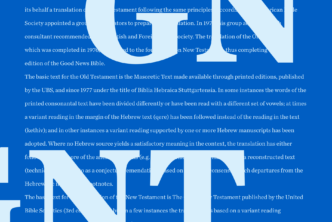This is a guest post about faith by Andrew B. Perrin. assistant professor of religious studies and co-director of the Dead Sea Scrolls Institute at Trinity Western University.
A few years ago I googled “faith” and discovered that the top two hits were a George Michael video on YouTube, which made me chuckle, and a Wikipedia entry, which reads, “The precise understanding of the term ‘faith’ differs among the various Christian traditions.”
How can Christians differ on their view of faith? Isn’t faith a belief in Jesus’ death, resurrection and our subsequent salvation? Or does faith entail more than this, as Hebrews 11:1, the only place a definition of “faith” is provided in the New Testament, seems to indicate? For the author of Hebrews, “faith” is not just about a distant reality but about how our actions connect to that reality.
Unpacking the contextual definition of Hebrews 11:1
Hebrews 11:1 defines pistis (πίστις) as “the assurance of things hoped for, the conviction of things not seen.” We can unpack this definition by investigating how the words “assurance” and “conviction” are used in the book.
The definition of pistis (πίστις) in Hebrews 11:1 is part of a wider theme in Hebrews: The things we see in the world correspond to better things in the heavenly realm (see Heb 11:3). We first encounter this idea in Heb 1:3, which says that Jesus is the exact imprint of God’s “nature” (hupostasis, ὑπόστασις). The word hupostasis (ὑπόστασις) is also translated as “confidence” in Heb 3:14. The Theological Dictionary of the New Testament suggests that “faith” is identified with the heavenly realm—the reality of believers’ hope. Pistis (πίστις) is both the proof that what we believe is real, as well as the certainty that our hopes will become actualized in heaven.
Walking through the Old Testament ‘Hall of Faith’
Hebrews 11:1 is linked to the rest of the chapter with the repetitive phrase “by faith” (pistei, πίστει), which describes the actions and attitudes of Israel’s ancestors. We will focus on the author’s examples of Abraham and Moses to understand exemplary faith.
Abraham obediently left his home, not knowing his destination, to live nomadically in the “Promised Land.” “In faith” he sought a permanent residence in a city “whose designer and builder is God” (Heb 11:8–10). His journey to Canaan exemplifies faith in his earthly life and shows his desire for “a better country, that is, a heavenly one” (Heb 11:16).
Moses suffered with his fellow Israelites knowing that in the end it would be worth it (Heb 11:25–26). Unafraid of Pharaoh’s fury, Moses left Egypt and “endured as seeing [God] who is invisible” (Heb 11:27). His actions demonstrated that trials serve a greater purpose and that he was confident in a God that could not be seen.
These two examples (and many more in Heb 11!) show that pistis (πίστις) for the author of Hebrews is about understanding the big picture. Firm “faith” enabled Israel’s forefathers to follow after after promises whose fulfillment were on a distant horizon.
Applying the message of ‘faith’ in Hebrews 11
How was the author’s angle on pistis (πίστις) relevant for the original audience and the church today? Before Heb 11 the author implores Christians to persevere in the face of adversity and, have confidence in God, assuring them that His promises will be fulfilled (Heb 10:19–38). After Heb 11, the author revisits this theme, expressing the need to persevere and look to Jesus, “the founder and perfecter of our faith” (Heb 12:2). This wider scope shows us that “faith” is about holding fast to Jesus—no matter what. Even though God’s promises at times seem far off, we can be certain that their fulfillment awaits us at the end of life, despite difficult patches.
Hebrews 11 teaches us that pistis (πίστις) is about more than belief—“faith” is a present affirmation of God’s existence, confidence in his ability to enact change in the world, and certainty that his promises will be fulfilled.
All Scripture quotations are from the esv.
***
A version of this article originally appeared with the title “Gotta Have Faith: Faith in Hebrews 11” in the July–August 2009 issue of Bible Study Magazine. Learn more about subscribing to Bible Study Magazine.







